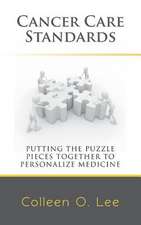Quality Cancer Care: Survivorship Before, During and After Treatment
Editat de Peter Hopewood, Mary J. Milroyen Limba Engleză Paperback – 12 iun 2018
Maintaining quality and improving cancer care does not occur in a vacuum. It requires a coordinated effort among many team members to whom this book is directed. Cancer care in the United States is in crisis as per a recent National Institute of Health publication. Much of this has to do with the complexity of the cancer care, its delivery systems, the aging population and the diminishing workforce. We need to be smarter and more efficient to de-escalate this crisis and improve the survival and survivorship of our cancer patients. Improved survivorship of families and caregivers will be included as well.
The book will follow the continuum of cancer care model as its outline vide infra. It will provide many concrete instances of successful practices and programs which improve survivorship. Initially it will discuss the current crisis on a global and then national platform. There will be a discussion about disability adjusted life years lost, lost productivity, loss of life and its impact upon the nation and communities. The financial impact of cancer on society and government will be included in this. Population health management as regards cancer will then look at communities served, community health needs assessments and social determinants of health. How prevention and screening programs can be formulated from the above will be illustrated.
Compliance with treatments as promulgated by the Commission on Cancer’s Cancer Program Practice Performance Reports (CP3R) will be reviewed. The relationship between compliance and improved survival will be highlighted. Navigation and distress management to assure patients complete planned treatments will be included in this section.
Quality of survivorship will review the four domains of life- spiritual, social, psychological and physical. How these can be maximized through system improvement and program development willbe illustrated. Financial issues and legal protections will also be included in this section. Survivorship care planning i.e. surveillance for recurrent cancer, prevention of related and new cancers will be an integral part of this section.
Palliative, end of life care and bereavement care will complete the continuum cycle. Identifying hospitalized patients in need of palliative needs will be refreshed. How to establish an in-patient palliative care team and creating a seamless transition from in-patient to out-patient palliative care will be presented.
Intended Audience
Administrative and clinical staff involved in the delivery of cancer care including: hospital executives, physicians, nurses, radiation therapists, psychology counselors, social workers, physical therapists, occupation therapists, nutritionists, government, healthcare insurance representatives, etc.
Preț: 778.44 lei
Preț vechi: 819.41 lei
-5% Nou
Puncte Express: 1168
Preț estimativ în valută:
148.96€ • 153.91$ • 123.92£
148.96€ • 153.91$ • 123.92£
Carte disponibilă
Livrare economică 27 februarie-13 martie
Preluare comenzi: 021 569.72.76
Specificații
ISBN-13: 9783319786483
ISBN-10: 3319786482
Pagini: 454
Ilustrații: XIII, 290 p. 37 illus., 33 illus. in color.
Dimensiuni: 155 x 235 x 17 mm
Greutate: 0.41 kg
Ediția:1st ed. 2018
Editura: Springer International Publishing
Colecția Springer
Locul publicării:Cham, Switzerland
ISBN-10: 3319786482
Pagini: 454
Ilustrații: XIII, 290 p. 37 illus., 33 illus. in color.
Dimensiuni: 155 x 235 x 17 mm
Greutate: 0.41 kg
Ediția:1st ed. 2018
Editura: Springer International Publishing
Colecția Springer
Locul publicării:Cham, Switzerland
Cuprins
Outlining the Crisis in Cancer Care.- Public Reporting of Institution and Provider Level Outcomes.- Cancer Statistics: Global and National.- Understanding the Social Determinants of Cancer: Challenges, Opportunities and Pathways to Success.- How Prevention and Screening Programs Can Be Identified Through a Community Health Needs Assessment.- The Role of Quality Metrics in Improving Oncologic Survival.- Patient Navigation in Cancer Care Delivery.- Survivorship.- Oncology Rehabilitation.- Building a Team to Improve Cancer Survivorship--Integrative Care’s Increasing Role.- Medical-Legal Partnerships in Cancer Care.- Palliative Care for Cancer and Treatment Related Changes for In-Patients.- Ambulatory Palliative Care.- End-of-Life Care and Cancer: Psychosocial Needs of Patients and the Bereaved.- Physician Leadership.
Notă biografică
Peter Hopewood, MD, FACS
Managing Partner and General Surgeon
Cape Cod Surgeons P.C.
Chair Cancer Liaison Physician Committee
Commission on Cancer American College of Surgeons
210 Jones Road
Falmouth, MA 02540 USA
Mary J Milroy MD, FACS
Clinical Professor, Department of Surgery
Sanford School of Medicine, University of South Dakota
Immediate Past Chair Cancer Liaison Physician Committee
Commission on Cancer American College of Surgeons
215 E Clark Street
Vermillion, SD 57069 USA
Managing Partner and General Surgeon
Cape Cod Surgeons P.C.
Chair Cancer Liaison Physician Committee
Commission on Cancer American College of Surgeons
210 Jones Road
Falmouth, MA 02540 USA
Mary J Milroy MD, FACS
Clinical Professor, Department of Surgery
Sanford School of Medicine, University of South Dakota
Immediate Past Chair Cancer Liaison Physician Committee
Commission on Cancer American College of Surgeons
215 E Clark Street
Vermillion, SD 57069 USA
Textul de pe ultima copertă
This book follows the continuum of cancer care model as its outline vide infra. As cancer is now a very multidisciplinary disease, it encourages dedicated professionals from various specialties as well as active patient cooperation in order to improve successful treatment and survival. This text will serve as a detailed reference source for healthcare providers intending to improve the quality of survivorship of cancer patients, as well as help create affordable care plans.
Initially it discusses the current cancer care crisis on a global and then national platform. Chapters include discussions about disability adjusted life years lost, lost productivity, loss of life and its impact upon the nation and communities. In order to deescalate the financial impact of cancer on society and government, this text incorporates smarter and efficient treatment alternatives that will also improve the survivorship of patients, families and caregivers. It also illustrates how prevention and screening programs can be incorporated to improve cancer care.
Quality Cancer Care: Survivorship Before, During and After Treatment will become an invaluable resource for healthcare professionals and clinical staff involved in the delivery of cancer care.
Caracteristici
Provides many concrete instances of successful practices and programs which improve survivorship Discusses the current crisis on a global and national platform Written by experts in the field



















